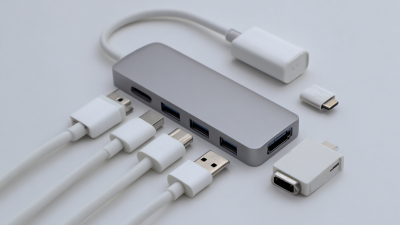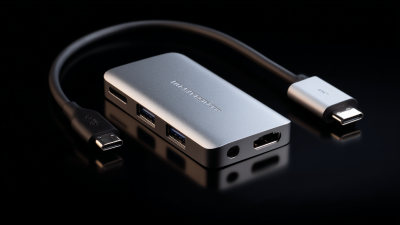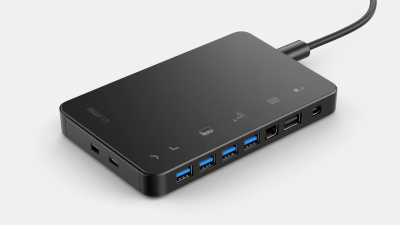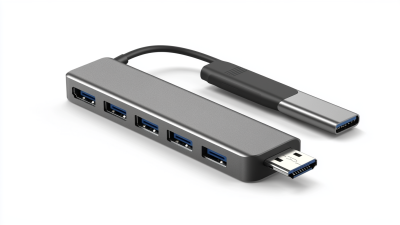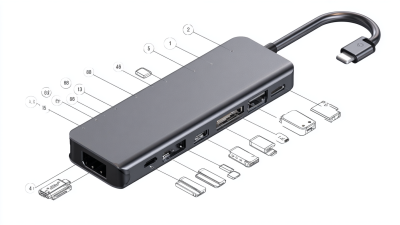
-
Home
-
Products
-
About Us
-
OEM&ODM
-
News
-
Contact Us
Inquiry
Form loading...

As we venture further into the digital age, the necessity for efficient power connectivity has never been more pressing. The rising prevalence of smart devices, combined with the proliferation of remote working setups, has dramatically increased the demand for versatile and reliable charging solutions. According to a recent report by MarketsandMarkets, the global USB Type-C market is expected to grow from $1.1 billion in 2021 to $29.5 billion by 2026, reflecting a compound annual growth rate (CAGR) of 84.5%. Central to this transformative landscape are Type C Charging Hubs, which not only offer rapid charging capabilities but also streamline device management for both consumers and businesses alike. By enabling multiple device connections within a single hub while maintaining optimal performance, Type C Charging Hubs are set to revolutionize how we power our increasingly interconnected world.

The rising adoption of Type-C technology is transforming the way we manage devices. As a versatile and efficient connector, USB Type-C offers numerous advantages, including faster charging times and the ability to transfer data at unprecedented speeds. A recent survey found that over 60% of consumers are now prioritizing Type-C compatibility when purchasing new devices, highlighting a significant shift in consumer behavior. This trend indicates a collective demand for standardized charging solutions that minimize clutter and maximize connectivity.
When integrating Type-C charging hubs into your setup, consider these tips: First, evaluate your power needs based on the number of devices you regularly use. Choose a hub that provides sufficient ports and power output for your gadgets. Second, opt for a hub with additional features such as HDMI support for video output and built-in data transfer capabilities. This not only enhances functionality but streamlines your workspace. Lastly, keep an eye on emerging trends in charging technology to ensure your devices remain future-proof and efficient.
As Type-C technology continues to rise, it brings with it a new era of device management that promotes efficiency and convenience. Embracing this change allows users to stay ahead in a fast-paced digital landscape where connectivity is key.
In an era where remote work and digital connectivity have become the norm, the introduction of Type C charging hubs is set to revolutionize device management in professional environments. According to a report by Grand View Research, the global demand for multi-device charging stations is expected to reach $7.78 billion by 2025. This growth reflects the increasing reliance on technology and the need for efficient workspace solutions that streamline connectivity.
Type C charging hubs not only provide faster charging but also enable simultaneous connections for multiple devices, reducing cable clutter and enhancing productivity. A recent study by IDC highlights that employees using organized charging solutions report a 23% increase in efficiency, as these hubs simplify the transition between work devices. With the ability to support various peripherals, from laptops to smartphones, these hubs create a seamless and integrated workspace, facilitating collaboration and communication among team members regardless of their location.
The adoption of Type C charging hubs thus becomes integral in optimizing both organization and connectivity in modern workplaces.
The rapid evolution of technology necessitates robust solutions for power delivery, and Type-C charging hubs are here to redefine our device management practices. As we transition into a future brimming with interconnected devices, the importance of universal charging standards cannot be overstated. Type-C, with its reversible design and capability for higher power transfer, positions itself as a lifeline for future-proofing our electronic devices. By supporting various devices under a single standard, Type-C simplifies our tech ecosystem, diminishing the clutter of multiple cables and chargers.
Moreover, the enhanced power delivery capabilities of Type-C charging hubs not only facilitate faster charging but also ensure that power is distributed intelligently across devices. This means users will experience less downtime and an optimized usage of their electronic gadgets. As businesses and individuals alike adapt to more mobile and demanding lifestyles, the efficiency of charging solutions directly impacts productivity. Thus, embracing Type-C technology is a strategic step towards maintaining device reliability and performance, securing a seamless integration of innovative technology into our daily routines.
| Device Type | Power Delivery (W) | Charging Speed (0-100%) | Hubs Supported | Data Transfer Rate (Gbps) |
|---|---|---|---|---|
| Smartphone | 18 | 50 min | Dual USB-C Hubs | 5 |
| Laptop | 60 | 1.5 hrs | Multi-Port Hubs | 10 |
| Tablet | 30 | 2 hrs | USB-C Hubs | 5 |
| Wearable | 5 | 30 min | Single USB-C Chargers | 2 |
The rapid evolution of technology has brought about a significant demand for versatile and efficient charging solutions. As we approach 2025, the market for Type-C charging hubs is projected to witness exceptional growth, driven by increasing consumer reliance on multiple devices and the need for streamlined connectivity. With the advantages of faster charging speeds and universal compatibility, Type-C hubs are becoming the go-to solution for tech-savvy users who prioritize efficiency in their daily device management.

In addition to convenience, the rise of remote work and mobile lifestyles has further fueled the demand for Type-C solutions. Businesses are recognizing the need to equip their employees with adaptable charging options that can support various devices seamlessly. Market analysts estimate that the Type-C ecosystem will expand considerably as manufacturers innovate and introduce new products tailored to meet the evolving needs of users. This trend indicates a transformative shift in how we approach power connectivity, ultimately enhancing productivity and improving the overall user experience in both personal and professional settings.
In modern work environments, the integration of Type C charging hubs has emerged as a game-changer for device management. These hubs not only simplify the connectivity of multiple devices but also enhance the efficiency of workflows. Real-world applications showcase their versatility, enabling seamless connections for laptops, smartphones, and peripherals in offices, co-working spaces, and even home setups. By providing a unified solution for charging and data transfer, Type C hubs empower employees to maintain productivity without the clutter of multiple cables and adapters.
The adoption of Type C hubs aligns with the ethos of Industry 4.0, where connectivity and smart technologies play a crucial role in streamlining operations. Companies leveraging these hubs have reported improved collaboration and faster response times in project management. The ability to standardize connections fosters an environment conducive to innovation, as teams can easily share resources and communicate effectively. As organizations continue to adapt to changing technological landscapes, the role of Type C charging hubs will likely expand, driving further advancements in how we manage devices and infrastructure in the workplace.

